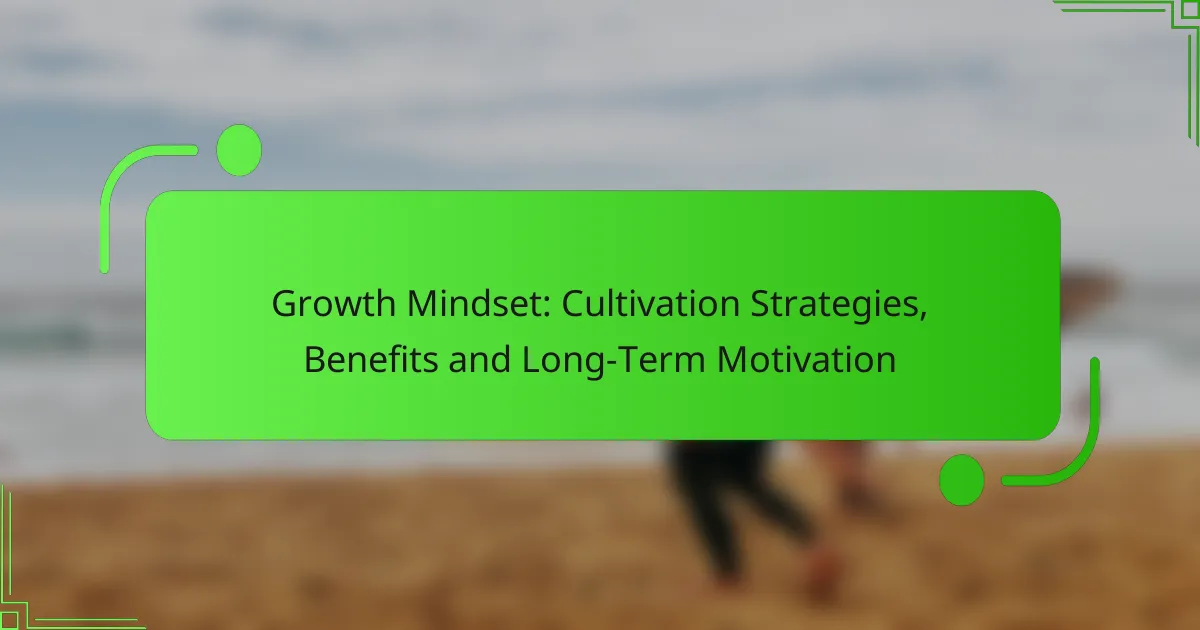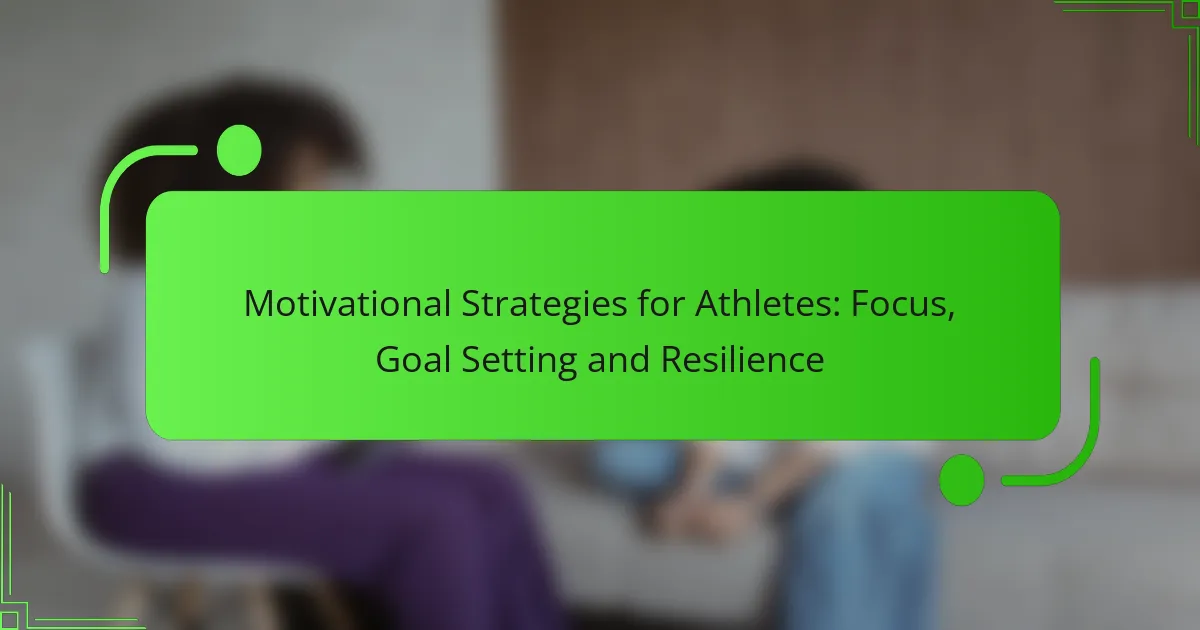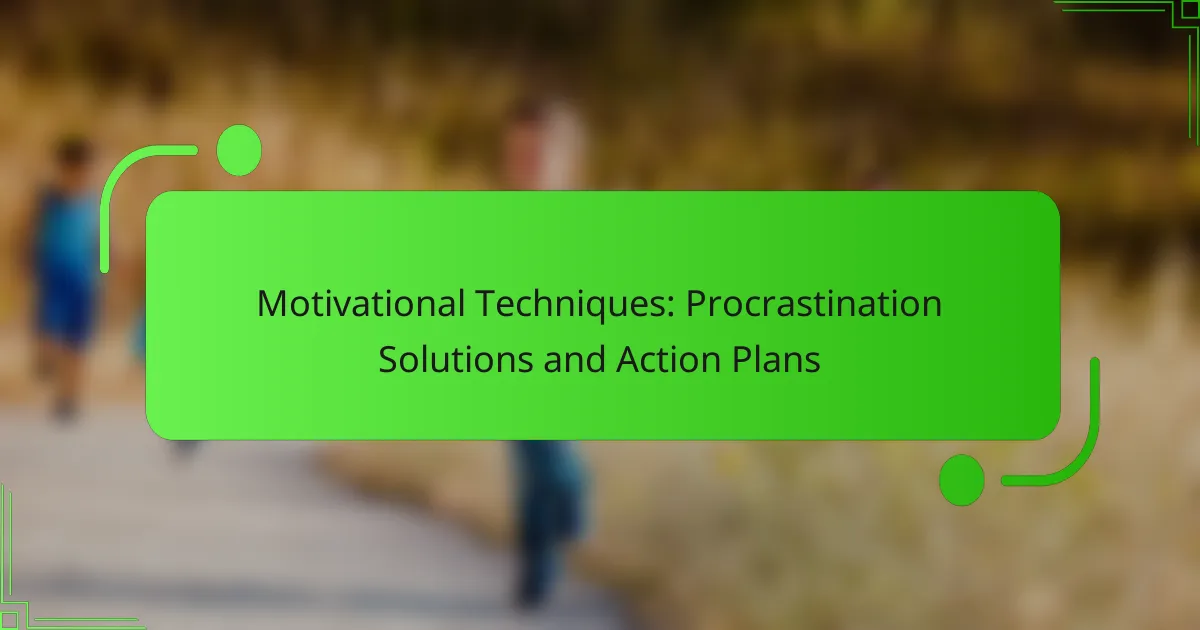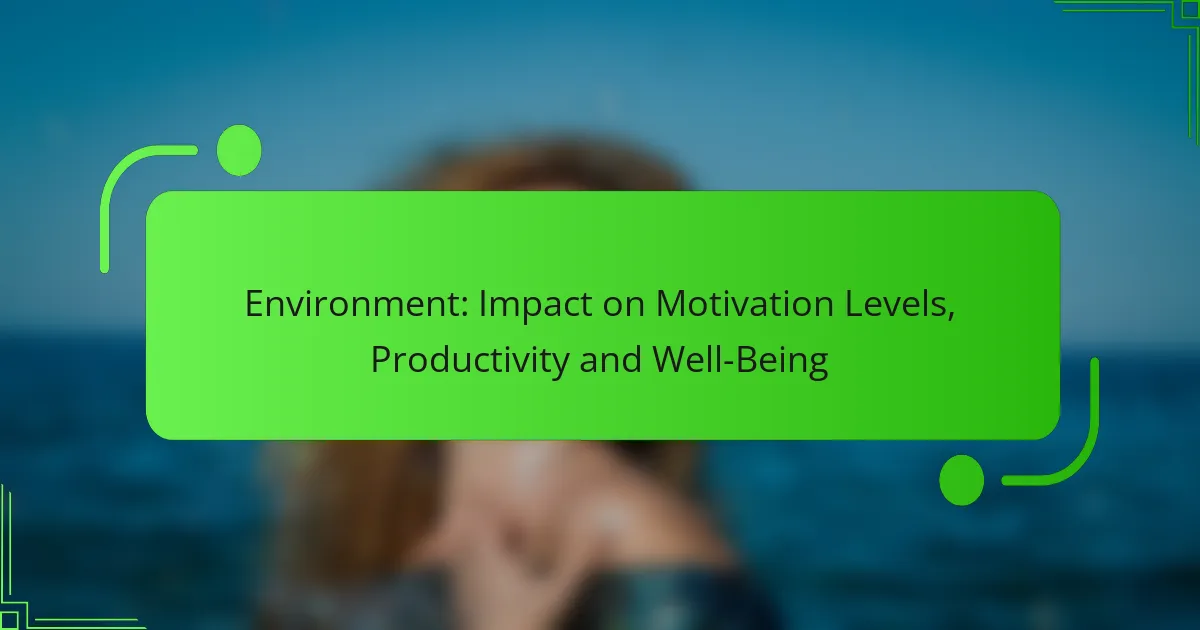A growth mindset is essential for personal development, as it encourages individuals to embrace challenges and view failures as opportunities for learning. By cultivating this mindset, one can experience enhanced resilience, improved problem-solving skills, and increased motivation, leading to long-term success and well-being. Adopting strategies that promote a growth mindset can transform your approach to challenges and foster a lifelong love of learning.
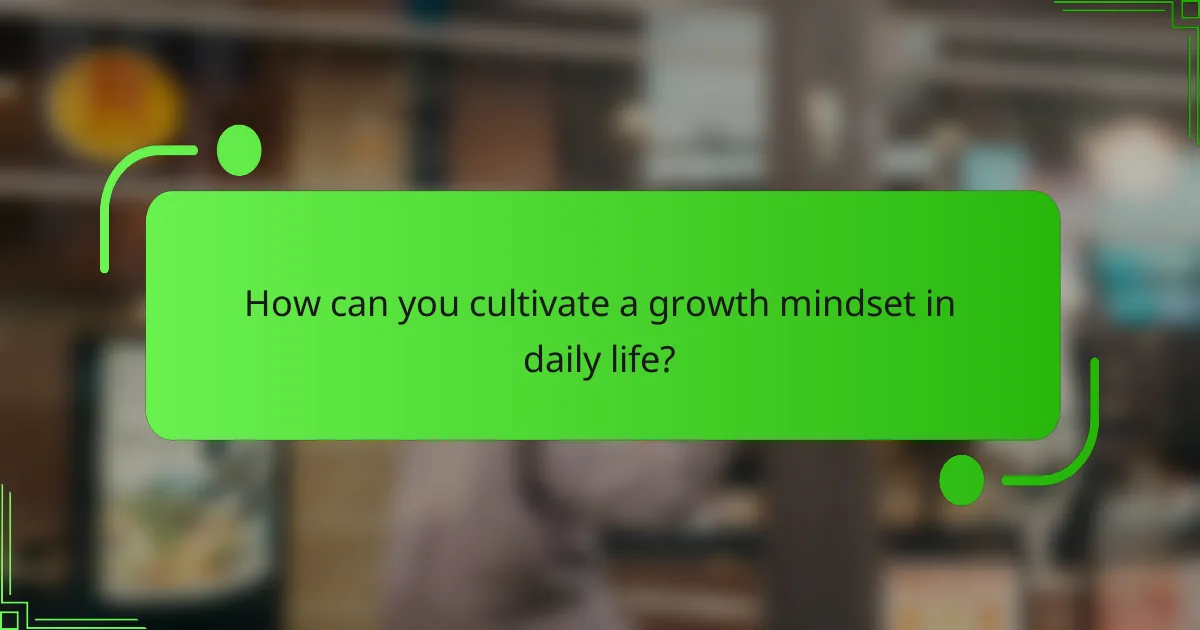
How can you cultivate a growth mindset in daily life?
Cultivating a growth mindset in daily life involves adopting attitudes and practices that encourage learning and resilience. By focusing on self-improvement and viewing challenges as opportunities, you can develop a mindset that thrives on growth.
Practice self-reflection
Self-reflection is a critical step in cultivating a growth mindset. Take time regularly to assess your thoughts, feelings, and reactions to various situations. Journaling can be an effective tool for this, allowing you to track your progress and identify areas for improvement.
Consider asking yourself questions such as, “What did I learn today?” or “How did I handle challenges?” This practice helps you recognize your growth over time and reinforces the belief that you can develop your abilities.
Embrace challenges
Embracing challenges is essential for fostering a growth mindset. Instead of avoiding difficult tasks, approach them with curiosity and determination. Challenges can help you stretch your abilities and discover new skills.
Start by setting small, manageable challenges in your daily routine, such as learning a new skill or tackling a complex project at work. Celebrate your efforts, regardless of the outcome, to reinforce the value of perseverance.
Seek feedback actively
Actively seeking feedback is a powerful way to cultivate a growth mindset. Constructive criticism can provide valuable insights into your performance and areas where you can improve. Approach feedback with an open mind and a willingness to learn.
Consider asking colleagues or mentors for their perspectives on your work. When receiving feedback, focus on understanding the message rather than defending your actions. This approach fosters a culture of continuous improvement.
Set learning goals
Setting learning goals is a practical strategy for developing a growth mindset. Instead of focusing solely on performance outcomes, establish specific, measurable goals that emphasize skill development and knowledge acquisition. This shift in focus encourages a love for learning.
For example, instead of aiming to achieve a certain sales target, set a goal to learn a new sales technique each month. This way, you cultivate your abilities while keeping the pressure of performance at bay.
Surround yourself with growth-oriented individuals
Surrounding yourself with growth-oriented individuals can significantly influence your mindset. Engage with people who inspire you to learn and grow, as their attitudes can reinforce your own. Look for mentors, peers, or communities that prioritize personal development.
Participate in workshops, networking events, or online forums where growth is a shared value. These interactions can provide motivation and support, making it easier to maintain a growth mindset in your daily life.
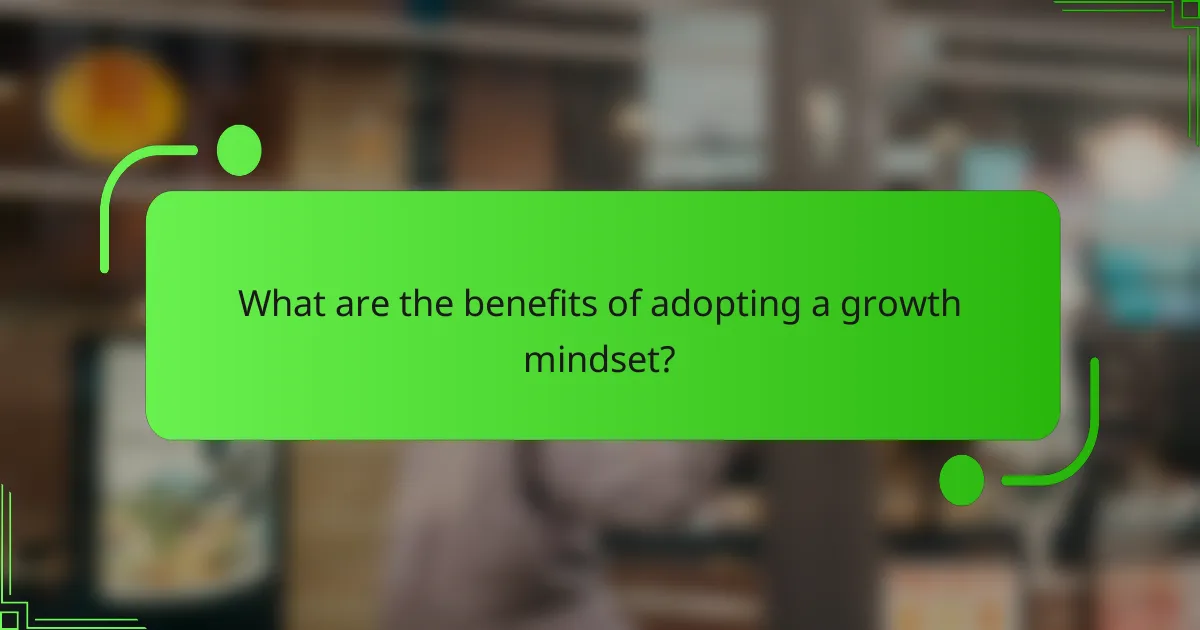
What are the benefits of adopting a growth mindset?
Adopting a growth mindset leads to numerous benefits, including enhanced resilience, improved problem-solving abilities, better academic performance, and greater overall well-being. These advantages stem from the belief that abilities and intelligence can be developed through dedication and hard work.
Increased resilience
A growth mindset fosters resilience by encouraging individuals to view challenges as opportunities for growth rather than obstacles. When faced with setbacks, those with a growth mindset are more likely to persist and find alternative solutions.
For example, students who embrace a growth mindset are more inclined to tackle difficult subjects, knowing that effort and practice can lead to improvement. This resilience helps them bounce back from failures and maintain motivation over time.
Enhanced problem-solving skills
Individuals with a growth mindset tend to develop superior problem-solving skills as they approach challenges with curiosity and a willingness to learn. They are more likely to explore various strategies and seek feedback, which enhances their ability to find effective solutions.
In practical terms, this means that a person facing a complex issue at work may brainstorm multiple approaches instead of giving up. This adaptability not only improves their problem-solving abilities but also increases their confidence in tackling future challenges.
Improved academic performance
Research indicates that students with a growth mindset often achieve better academic outcomes compared to their peers with a fixed mindset. They are more likely to engage in learning activities, seek help when needed, and persist through difficulties.
For instance, a student who believes they can improve their math skills through practice is more likely to invest time in studying and seek tutoring, leading to higher grades and a deeper understanding of the subject matter.
Greater overall well-being
Embracing a growth mindset contributes to greater overall well-being by promoting a positive outlook on life and reducing anxiety related to performance. Individuals are more likely to experience satisfaction and fulfillment when they focus on growth and learning rather than perfection.
Additionally, this mindset can lead to healthier relationships, as individuals are more open to feedback and collaboration. Engaging in supportive environments fosters a sense of community, which further enhances well-being.
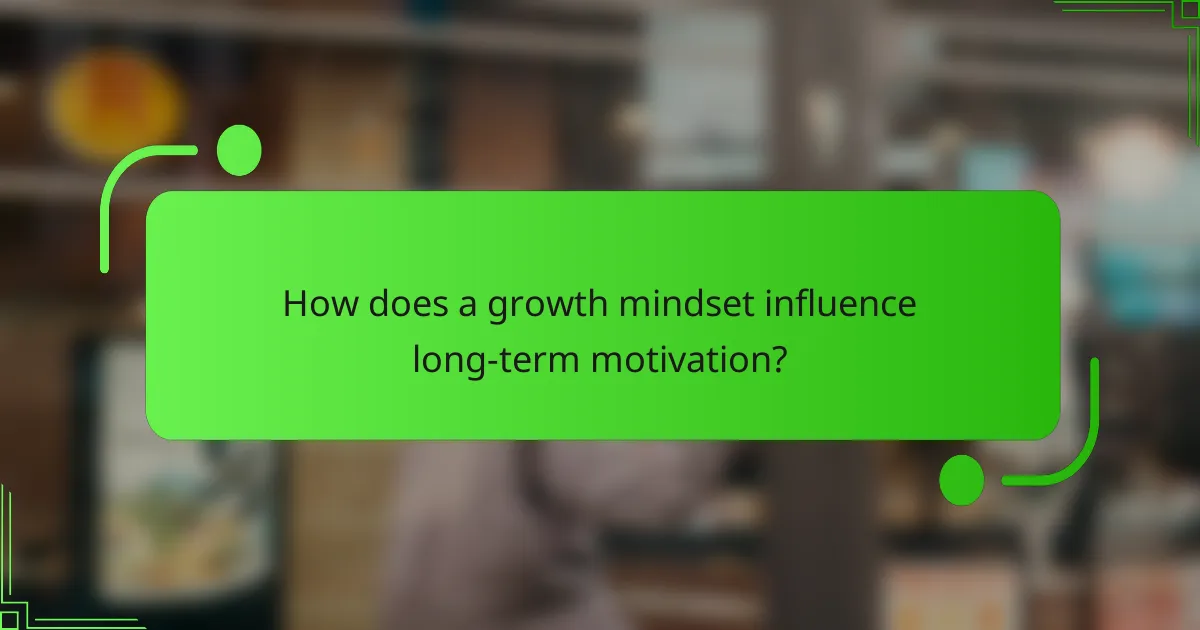
How does a growth mindset influence long-term motivation?
A growth mindset significantly boosts long-term motivation by fostering resilience and a positive outlook on challenges. Individuals with this mindset view failures as opportunities for growth, which encourages them to persist in their efforts over time.
Encourages persistence
A growth mindset promotes persistence by encouraging individuals to embrace challenges rather than shy away from them. When faced with obstacles, those with a growth mindset are more likely to keep trying, believing that effort will lead to improvement. This persistence is crucial for achieving long-term goals, whether in education, career, or personal development.
For example, a student who struggles with math may initially feel discouraged, but with a growth mindset, they are likely to seek help, practice more, and ultimately improve their skills. This approach not only enhances their math abilities but also builds a habit of perseverance that can be applied in other areas of life.
Fosters a love for learning
A growth mindset fosters a love for learning by shifting the focus from grades and outcomes to the learning process itself. Individuals who embrace this mindset are curious and eager to explore new concepts, knowing that mastery comes with time and effort. This intrinsic motivation can lead to a lifelong passion for acquiring knowledge and skills.
For instance, a professional who regularly engages in training and development opportunities demonstrates a growth mindset. They view each learning experience as a chance to expand their expertise, which not only benefits their career but also enhances their overall satisfaction and engagement in their field.
Builds confidence in abilities
A growth mindset builds confidence in abilities by reinforcing the belief that skills can be developed through dedication and hard work. This self-efficacy encourages individuals to take on new challenges without the fear of failure, as they understand that setbacks are part of the learning journey.
Consider an athlete who practices diligently, knowing that improvement is a gradual process. Each small achievement boosts their confidence, leading them to tackle more complex skills and competitions. This cycle of success and confidence reinforces their commitment to their sport and fuels their motivation to excel further.
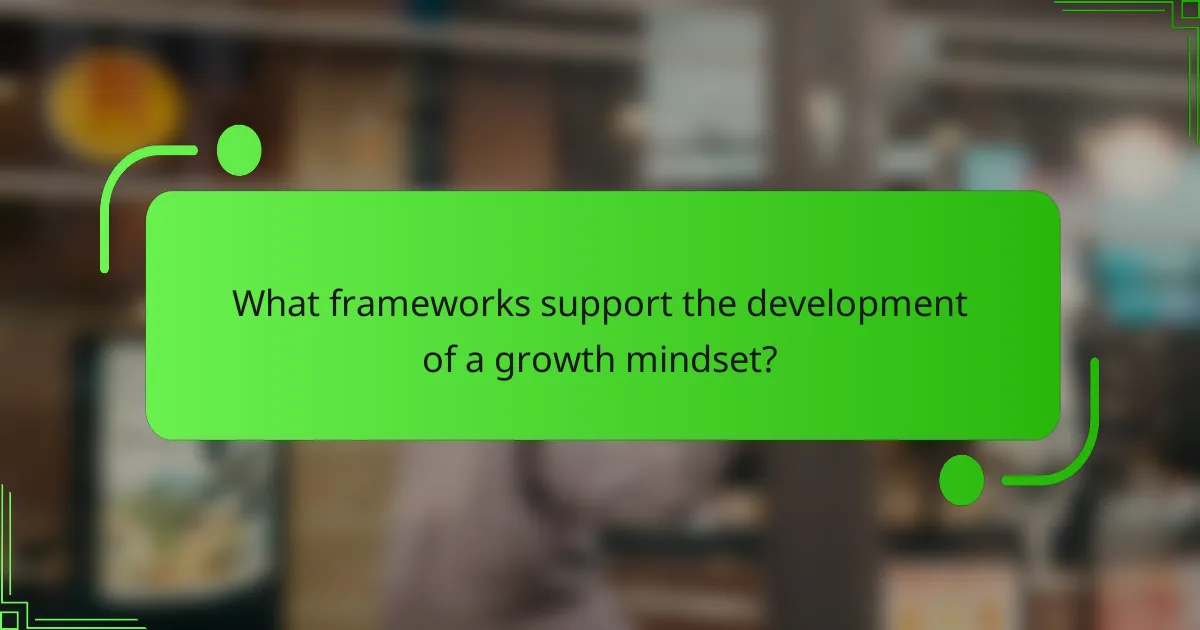
What frameworks support the development of a growth mindset?
Several frameworks can effectively foster a growth mindset, enabling individuals to embrace challenges and persist through difficulties. Key frameworks include Carol Dweck’s mindset theory and the SMART goals framework, both of which provide structured approaches to personal and professional development.
Mindset theory by Carol Dweck
Carol Dweck’s mindset theory distinguishes between a fixed mindset and a growth mindset. Individuals with a growth mindset believe that abilities and intelligence can be developed through dedication and hard work, which fosters resilience and a love for learning.
To cultivate a growth mindset, focus on embracing challenges, learning from feedback, and viewing effort as a path to mastery. For example, instead of avoiding difficult tasks, approach them as opportunities for growth. This shift in perspective can significantly enhance motivation and achievement.
SMART goals framework
The SMART goals framework helps individuals set clear and achievable objectives that align with a growth mindset. SMART stands for Specific, Measurable, Achievable, Relevant, and Time-bound, ensuring that goals are well-defined and attainable.
When applying the SMART criteria, consider setting goals that challenge your current abilities while remaining realistic. For example, instead of saying “I want to improve my skills,” specify “I will complete two online courses in my field within the next three months.” This clarity not only motivates but also provides a roadmap for progress.
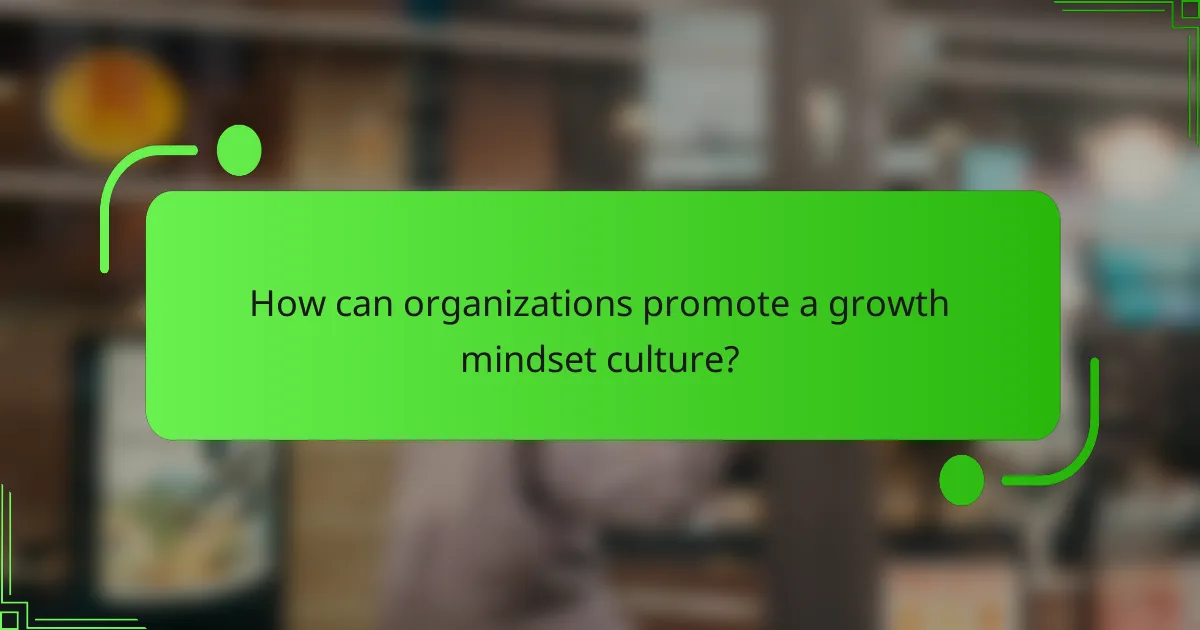
How can organizations promote a growth mindset culture?
Organizations can foster a growth mindset culture by encouraging continuous learning, embracing challenges, and providing constructive feedback. This approach not only enhances employee engagement but also drives innovation and adaptability within the workplace.
Implement continuous learning programs
Continuous learning programs are essential for cultivating a growth mindset culture. These programs can include workshops, online courses, and mentorship opportunities that encourage employees to acquire new skills and knowledge regularly.
To effectively implement these programs, organizations should assess the specific learning needs of their workforce and tailor offerings accordingly. For instance, providing access to industry-related courses or certifications can significantly boost employee motivation and performance.
Additionally, organizations should create a supportive environment where employees feel safe to experiment and learn from failures. This can be achieved by recognizing and rewarding efforts to learn, rather than just focusing on outcomes.
